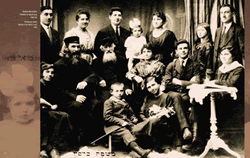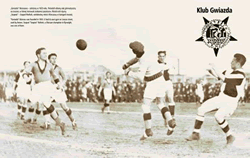Be Strong and Brave: Jews, Sport, Warsaw
Jewish Sports
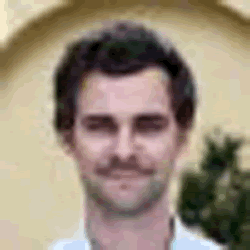
Mikolaj Glinski
2015/01/28 http://culture.pl/en/work/be-strong-and-brave-jews-sport-warsaw
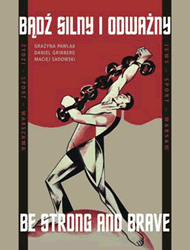
" seems like an odd expression. Are Jewish sports any different than "normal" sports? After all, sport is universal. But the album Be Strong and Brave shows otherwise.
Jewish minorities played an important role in the sporting successes of the Second Republic of Poland (1918-1939). "And it was not incidental" Professor Daniel Grinberg comments in the album Be Strong and Brave. How did a nation whose spiritual traditions value the soul over the body start doing sports on a mass scale? And how did sports create a supranational link between nations becoming a political and social weapon of battle - and finally a challenge to anti-Semitism?
The bilingual (Polish/English) album Be Strong and Brave with historical commentary by Professor Grinberg and archival photographs shows how Jews in pre-war Warsaw invented Jewish sport.
Why Jewish sports?
Jewish sports grew out of entirely different traditions than European sports, Professor Grinberg explains. The latter had roots in the old Greek concept of Kalos kagathos, which gave rise to the Olympic games and physical exercise. "In the same period, the Jews did find pride in the biblical Samson and David's skills in using the slingshot. But the Greek cult of the body was a foreign concept and the Jews were always uneasy about male nudity" explains Grinberg.
Be Strong and Brave: Jews, Sport, Warsaw - Image Gallery
Muskeljudentum
Grinberg demonstrates when Jewish sports were born and he places that birthdate in a wider political, social and cultural context. He points towards German physical exercise routines which were gaining popularity. Jewish middle classes mimicked the life of the social group they aspired to join and thus discovered the German model of the Jahn system - a strongly militarised version of physical culture based on collective exercise or the copying of the German Turnvereins.
Grinberg also shows the particularity of the beginnings of Jewish sports, intricately linked with the Zionist movement and the call for a new Jew, the Halutz, as a reaction to the wave of pogroms in Eastern Europe. The Halutz was a pioneer prepared to be ready to colonize the deserts of Palestine and fend off the attacks of anti-Semites. "In contrast with the slender urban Jew, interested only in intellectual development and making his living from commerce, the Halutz was meant to be versatile, able to work the land with his hands." Grinberg clarifies, introducing the term "muscular Judaism".
Maccabi Warsaw
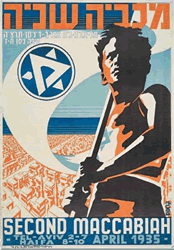
It wasn't until 1915 that the first club in Warsaw was founded. The German-occupied Polish capital housed its first athletic club, the biggest and most diverse Jewish sports club of the future Second Republic. It was a symbol of pride for the modernising Jewish minority and an important nexus in the world Maccabi movement (the name derives from Judah Maccabee – a leader of the Jewish revolt 167-160 BCE). Grinberg evokes the First World War head coach of the athletes of the Warsaw Maccabi club - a German ex-policeman from Bonn, Michael Alberskirch. Under his tutelage, the gymnasts learned Prussian discipline. Legend has it that in 1916, Alberskirch taught himself all commands in Hebrew in one day, shocking his students.
The Maccabi headquarters were located in the prestigious Simons Passage (on the corner of D?uga and Nalewki streets). The club also had a three-hectar field in the district of Praga with a playing field and a race track (currently located on the grounds next to the National Stadium). In the interwar period the club's athletes brought home a lot of medals.
At the 1932 Maccabi Games in Palestine, the Polish Maccabi athletes achieved great results. While in 1924 the Jewish representation wasn't allowed to take part in the Olympic games, in 1932 and 1935 the 66 strong representation of the Polish Maccabi won the team competition. Be Strong and Brave is the motto of the world Maccabi movement.
Along with Maccabi, there existed other Jewish clubs in Warsaw, like the club Gwiazda (Sztern) founded in 1923 and linked to the Zionist left. Its main focus was football.
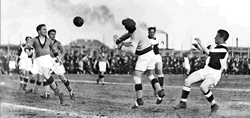
Football match of "Gwiazda", photo: press material
More than sport
Grinberg shows that Jewish clubs also engaged in activities other than sports. Maccabi had a drama and debate club, music groups, mandolin orchestras, and an art and photography studio. Informally the clubs were centres of education, culture and meeting points:
They had libraries, orchestras, organized evening classes, field trips and dances. They often also ran cafeterias. In other words, they formed small communities, formulating all leisure activities for their members. - Professor Grinberg adds.
For some of the athletes, the club was an alternative to everyday life which offered new perspectives:
After a day of work and learning, young people had a place to flip through magazines, talk to friends, flirt or listen to the latest recording of Vera Gran. They could learn to dance or even take a shower. Many homes still had no gramophones or bathrooms.
Sport and anti-Semitism
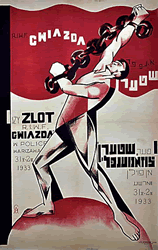
Grinberg also sheds light on how sport became a tool in the battle against prejudice and stereotypes.
"With the strength of King David and the Maccabees in mind, Jewish athletes fought against centuries of prejudice, spread throughout Poland and across Europe. They eagerly paraded in their uniforms and sought success in disciplines considered to be specialities of the "Aryan race", namely boxing, car racing or football".
There appear to be links between Jewish sport disciplines which build physical strength like wrestling, weightlifting, and boxing, and fighting anti-Semitism. As they watched a growing wave of pogroms sweep through the country, athletes created self-defence movements which were veritable battalions. In 1919, practices took place in the vast yard by the Nozyk Synagogue on Grzybowska 7. On nearby Prosta street there was a commerce school. Its students would attack Jews after school was over. One of the Maccabi Warsaw veterans reminisces that the attacks finally stopped after a couple of clashes with members of the self-defence movement.
Their generation - writes Grinberg - buried the stereotype of a lazy and feeble Jew, a coward and a klutz.
Sport was also a means of emancipation for women. The author brings up an example of overcoming greater cultural and religious barriers. In 1925 female Jewish divers won great popularity after a diving show off Kierbedzia bridge over the Vistula river. When the Polish divers were called to match the performance, none took up the challenge.
The most powerful 'fly' of Europe
The album is made up of small stories written with great skill by Grinberg and illustrated with archival photographs found by Maciej Sadowski, the author of a series of "photobiographies" ofJanusz Korczak, Ryszard Kapu?ci?ski and Jan Karski. One such story is that of Szapsel Rotholc (1913-1996), a boxer beloved by Warsaw and called the most powerful 'fly' of Europe (at the height of his career he weighed less than 35 kg). In 1936, he won a trip to the Berlin Olympics. He was to represent Poland but ended up not participating because of the Jewish boycott of the Nazi Olympics. After his return from Berlin, he was removed from the Jewish typesetters' trade union. From then on, he made ends meet by being a driver and mechanic. In his white and red Polish uniform, Szapsio defeated a representative of Nazi Germany, Nikolas Obermauer, shortly after Kristallnacht in 1938.
In 1940, together with his wife and child, he was taken to the ghetto, where he found work in the Jewish police, an arm of the Judenrat. He was accused of brutality towards prisoners and servility towards the Germans. He survived a assassination attempt by the Jewish underground ?ydowska Orgaznizacja Bojowa, and escaped the ghetto. Some of those who experienced brutality from the Jewish police never forgave him for surviving the Holocaust - writes Grinberg. After the war he was sentenced to two years' exclusion from the Jewish community and a three-year suspension of civil rights. In 1949, he emigrated to Belgium and later Canada, where he worked as a furrier. He died forgotten.
Grinberg also describes the life of Helena Bersohn, born into a large Orthodox family, who in 1931, at the age of 17 won the Polish discus championship. She was also one of the best Polish track and field athletes. In 1933 she left for Palestine, where she continued to break national records.
Interesting and forgotten figures of the sporting world emerge from the album: the diver Eugenia Frydam, ping pong champion Sztokfisz, or Ernest Wittman - a Legia Warszawa tennis player and polyglot who played doubles with the King of Sweden Gustav V several times; the swimmer, Olympic athlete Lejzor Ilja Szrajbman, who won the championship of Poland in 1935. He was involved with the Polish underground military, and died in the Warsaw ghetto in 1943.
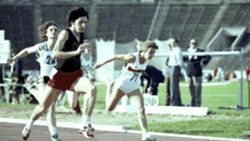
Why Are Poland’s Sport Feats Unknown Abroad? The Red and The White of the Matter
The Winawer Gambit
Grinberg's fascinating account of Jewish sport takes him into the 19th century, when the story of Szymon Winawer, the so-called Forerunner, unfolds (1838-1920). The world champion in chess (after whom a gambit and a defensive play in chess theory were named), would always stress that he represented Poland, not Russia, although much of Poland was under Russian occupation. For that reason he refused to take part in a Russian tournament in St. Petersburg in 1879 (the city in which four years earlier he had defeated Russia's entire top team including the famous Mikhail Chigorin. Grinberg's attention to detail lets us know that in Warsaw, Winawer used to play daily at the Semadeni cafe where he occasionally beat the Polish author Boles?aw Prus.
Jewish chess players and their successes would make for an entire different book. A separate place is reserved in the album for David Przepiórka, the first official Polish chess champion (1926). Grinberg's narrative reads like a thrilling journal:
"During the Chess Olympics in the Hague in 1928, Przepiorka, 48 at the time, led the Polish team to win bronze and himself beat Max Euwe, the future Dutch world champion. During the 3rd Chess Olympics in Hamburg, in 1930, the Polish team consisting almost entirely of Jewish players did even better. Akiba Rubinstein and Ksawery Tartakower helped the team win gold."
Przepiórka was executed in Palmiry in 1940. He was arrested in early 1940 for participating in a chess tournament, which were illegal under the occupation. Grinberg shares with his readers that if he had been younger, he could have survived the Holocaust like his colleagues who in the summer of 1939 went to Buenos Aires to participate in the next Chess Olympics.
Author: Miko?aj Gli?ski, translator: MJ 24/07/2014
B?d? silny i odwa?ny / Be Strong and Brave - Jews - Sport - Warsaw
texts: Gra?yna Pawlak, Maciej Sadowski, Daniel Grinberg
graphic design: Maciej Sadowski
Moj?esz Schora Foundation, Warsaw 2013
